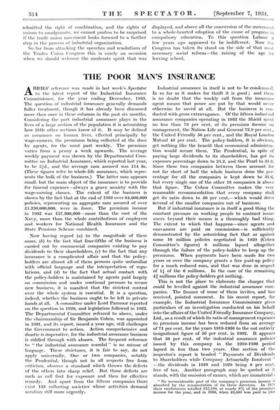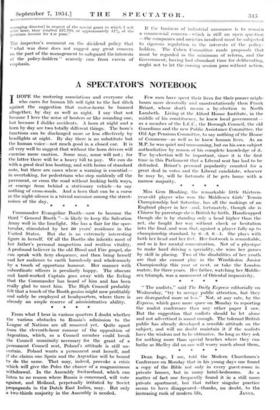THE POOR MAN'S INSURANCE
ABRIEF reference was made in last week's Spectator to the latest report of the Industrial Insurance Commissioner, for the year ending December, 1933. The question of industrial insurance generally demands fuller treatment, though it has already been discussed more than once in these columns in the past six months. Considering the part industrial assurance plays in the lives of a large section of the population it is astonishing how little other sections know of it. It may be defined as assurance on human lives, effected principally by wage-earners, the premiums being collected at the door by agents, for the most part weekly. The premium varies from a penny a week upwards. The average weekly payment was shown by the Departmental Com- mittee on Industrial Assurance, which reported last year, to be 22c1., and the average sum assured was £14 8s. (These figures refer to whole-life assurance, which repre- sents the bulk of the business.) The latter sum appears small, but the main object of the insurance is to provide for funeral expenses—always a grave anxiety with the wage-earning classes. The extent of the business is shown by the fact that at the end of 1932 over 84,000,000 policies, representing an aggregate sum assured of over £1,250,000,000, were in force. The premium income in 1932 was £57,300,000—more than the cost of the Navy, more than the whole contributions of employers and workers for National Health Insurance and the State Pensions Scheme combined.
Now having regard (a) to the magnitude of these sums, (b) to the fact that four-fifths of the business is carried out by commercial companies existing to pay dividends to their shareholders, (c) to the fact that any insurance is a complicated affair and that the policy- holders are almost all of them persons quite unfamiliar with official language and the interpretation of regu- lations, and (d) to the fact that actual contact with the policy-holders is maintained by agents paid largely on commission and under continual pressure to secure new business, it is manifest that the strictest control • over the whole system is essential. It is a question, indeed, whether the business ought to be left in private - hands at all. A committee under Lord Parmoor reported on the question in 1920, and legislation followed in 1923. The Departmental Committee referred to above, under the chairmanship of Sir Benjamin Cohen, was appointed in 1931, and its report, issued a year ago, still challenges the Government to action. Action comprehensive and drastic is imperative, for the industrial assurance business is riddled through with abuses. The frequent reference to "the industrial assurance scandal" is no misuse of • language. These strictures, it is fair to say, do not apply universally. One or two companies, notably the Prudential, though not in all respects free from criticism, observe a standard which throws the defects of the others into sharp relief. But those defects are such as call first for exposure and then for effective remedy. And apart from the fifteen companies there exist 155 collecting societies whose activities demand scrutiny still more urgently. Industrial assurance in itself is not to be condemned. In so far as it makes for thrift it is good ; and there is no doubt that the weekly call from the insurance agent means that pence are put by that would never otherwise be saved at all. But the business is con- ducted with gross extravagance. Of the fifteen industrial assurance companies operating in 1932 the Shield spent no less than 73 per cent, of its premium ificome on management, the Nation Life and General 72.9 per cent., the United Friendly 56 per cent., and the Royal London Mutual 43 per cent. The policy-holders, it is obvious, get nothing like the benefit that economical administra- tion would secure them. The Prudential, in spite of paying large dividends to its shareholders, has got its expenses percentage down to 24.2, and the Pearl to 31.3. Since these two companies between them account for not far short of half the whole business done the per- centage for all the companies is kept down to 31.6, but every single one of the other 13 companies is above that figure. The Cohen Committee makes the very reasonable recommendation that every company shall get its ratio down to 30 per cent.—which would drive several of the smaller companies out of business.
But if industrial insurance is in itself a good thing the constant pressure on working people to contract insur- ances beyond their means is a thoroughly bad thing. The extent to which that happens—since agents and canvassers are paid on commission—is sufficiently demonstrated by the astonishing fact that as against some 10 million policies negotiated in 1929 (Cohen Committee's figures) 6 millions lapsed altogether through the failure of the policy-holder to keep up the premiums. When payments have, been made for two years or over the company grants a free paid-up policy for a much reduced sum, and that was done in respect of 1f of the 6 millions. In the case of the remaining 4f millions the policy-holders got nothing.
This is not the place to elaborate the charges that could be levelled against the industrial assurance com- panies. The finance of some of them invites, and has received, pointed comment. In his recent report, for example, the Industrial Insurance Commissioner gives particulars of an investigation conducted on his behalf into the affairs of the United Friendly Insurance Company, Ltd., as a result of which its ratio of management expenses to premium income has been reduced from an average of 71 per cent. for the years 1919-1930 to the not entirely insignificant figure of 56 per cent. in 1932. It appears that 56 per cent, of the industrial assurance policies issued by this company in the 1919-1930 period lapsed in less than two years. One section of the _inspector's report is headed "Payments of Dividends to Shareholders while Company Actuarially Insolvent" • —the dividends in 1928 and 1929 being 8 per cent. free of tax. Another paragraph may be quoted as it stands, with the omission of names, which are immaterial :
• " No inconsiderable part of the company's premium income is absorbed by the remuneration of its three directors. In 1929 their emoluments totalled £22,100, or nearly 8% of the premium income for the year, and in 1930, when £9,400 was paid to Ithe
managing director] in respect of the special grant to which I will refer later, they totalled 07,700, or approximately 12% of the premium income for t le year."
The inspector's comment on the dividend policy that "what was done does not suggest any great concern on the part of the management to safeguard the interests of the policy-holders" scarcely errs from excess of emphasis. If Vie business of industrial assurance is to remain a commercial concern—which is still an open question —the companies and societies involved must he subjected to rigorous regulation in the interests of the policy- holders. The Cohen Committee made proposals that must be regarded as the minimum of reform, and the Government, having had abundant time for deliberating, ought not to let the coming session pass without action.







































 Previous page
Previous page